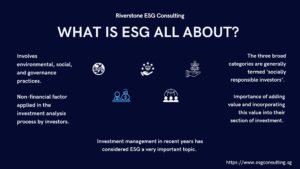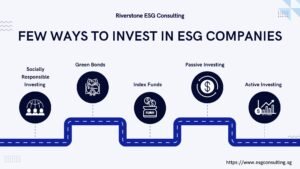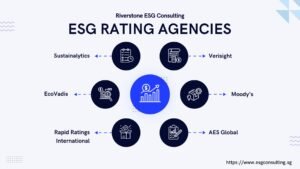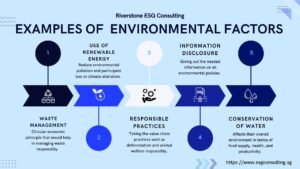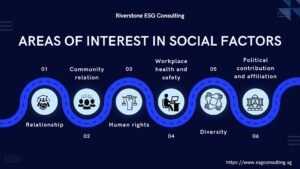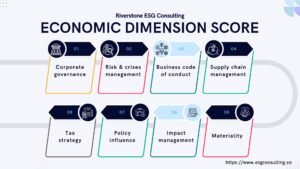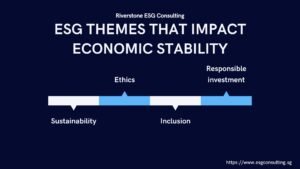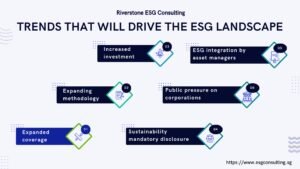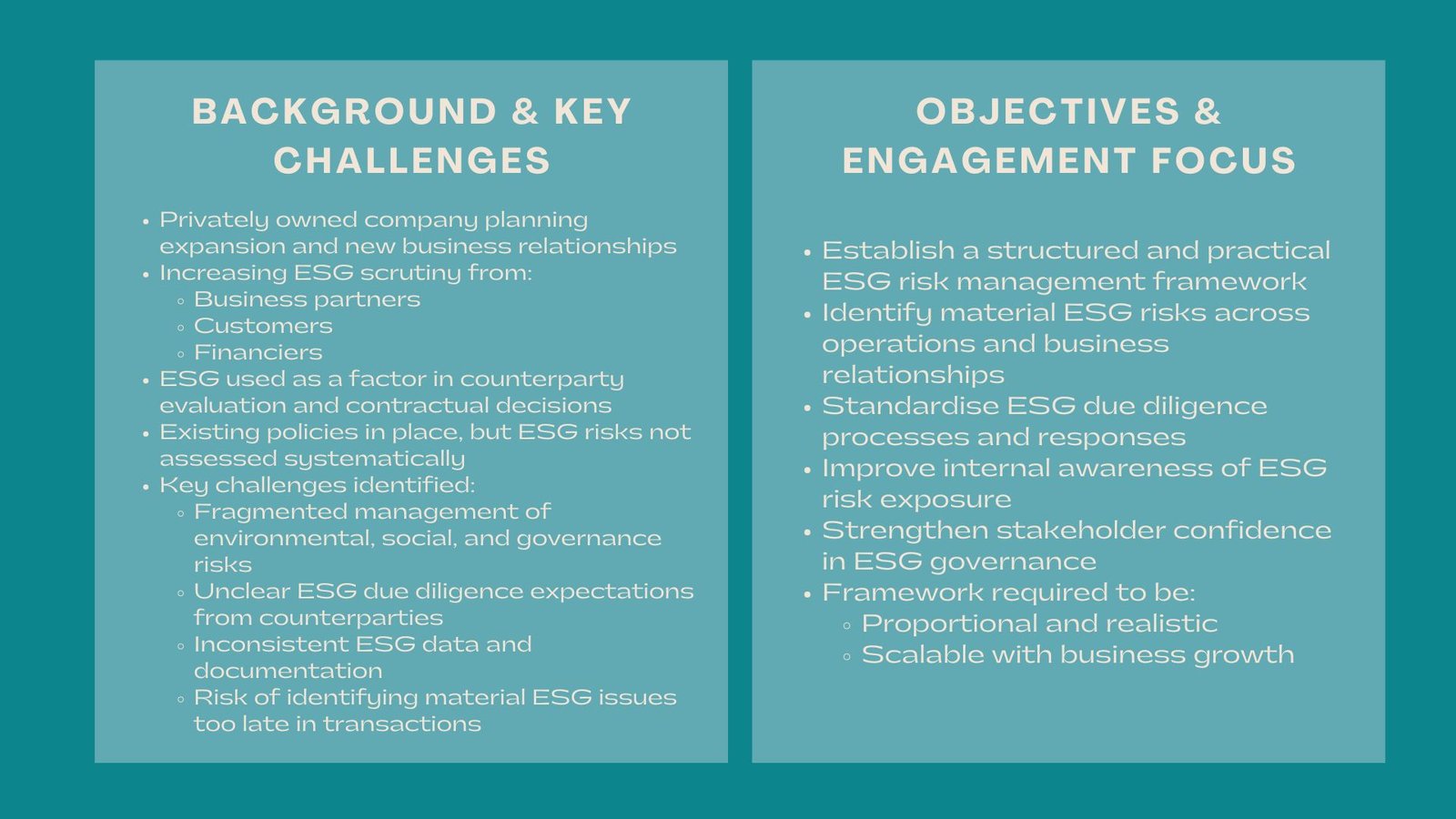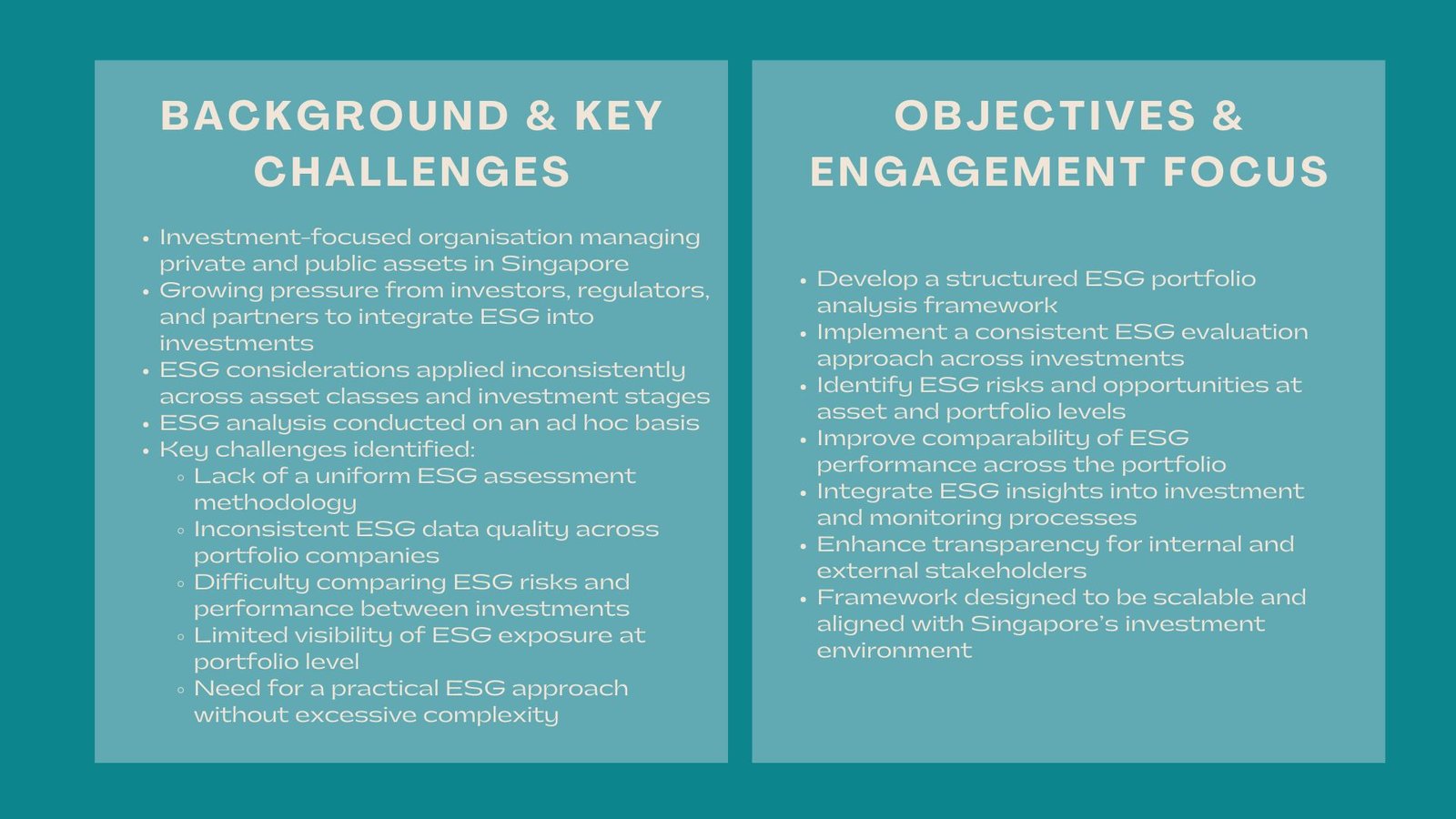ESG Data, Assurance, and Reporting Quality in Singapore
Introduction to ESG Reporting and Assurance in Singapore
The trend to disclose trustworthy and transparent Environmental, Social, and Governance (ESG) information is getting on the companies in the age of sustainability-driven decision-making. Sustainability is no longer viewed as a prelude to be added to the investors, regulators, and customers because they demand tangible evidence of corporate responsibility.
With intensified ESG reporting policies within the Singapore Exchange (SGX) and Monetary Authority of Singapore (MAS) regulations, the quality and credibility of sustainability reporting have turned out to be some of the hallmarks of reputation and value of a company. Independent assurance should be accompanied by high-quality ESG data, which will guarantee that sustainability reports do not contain advertisement statements but actual performance.
This article will discuss the importance of data quality and assurance, discuss how Singapore-based leading organizations are enhancing their ESG reporting models and what the best practices can assist the business to sustain transparency and trust.
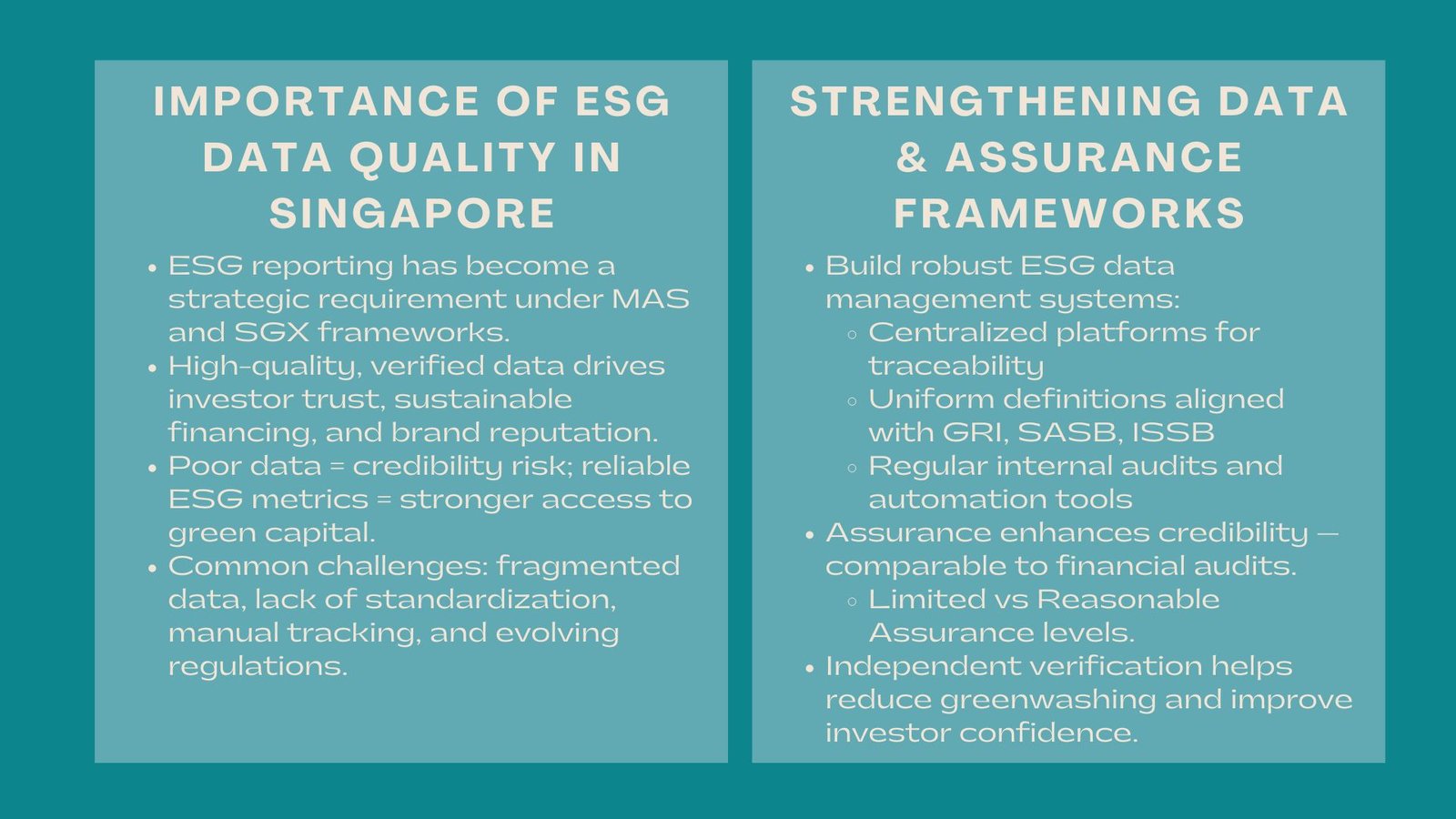
The Increasing Role of ESG Data Quality.
Companies over the years took ESG reporting as a compliance measure. Nonetheless, with the growing proportion of sustainability factors that affect investor confidence and loan stance, trusted ESG data is now becoming an essential business resource.
Poor quality data erodes credibility, introduces inequalities in reporting, and also puts organizations to reputational and financial damages. Conversely, properly organized ESG information gives actionable information to companies in order to make strategic choices that are informed concerning company climate risk, social responsibility, and governance performance.
The issue of the data quality is also important since ESG metrics have become the drivers of green financing access, impact on the valuations, and inclusion into sustainability indices. The data credibility of a company can either build or demolish the reputation whether a company is in need of investment or loan or a stakeholder approval.
ESG Data Collection Problems.
The gathering of sound and verifiable ESG facts is one of the most complicated assignments of companies. Most institutions are faced with the following problems:
Fragmented Data Sources
The ESG information usually sources in diverse departments, including environment, HR, procurement and operations, and is hard to incorporate and to confirm.
Lack of Standardization
Various frameworks, including GRI (Global Reporting Initiative), SASB (Sustainability Accounting Standards Board) and TCFD (Task Force on climate related financial disclosed), use various metrics to define them, resulting in discrepancies.
Manual Processes
The spreadsheets used to track ESG information by many companies are still exposing them to the risk of human error and those of having incompetent audit trails.
Changing Regulatory Requirements.
As standards and disclosure requirements by SGX and MAS change, firms are forced to constantly conform to their reporting systems in order to stay afloat.
In order to address these challenges, companies are resorting to technology based solutions and governance models that provide more accurate and reliable data
Strengthening Data Management Frameworks
Building a robust data management system is the first step toward credible reporting. This involves setting up processes for data collection, validation, and monitoring across the organization.
The ESG data management and assurance best practices for companies in Singapore emphasize a few essential actions:
- Centralized ESG Data Platforms: The deployment of digital applications that would bring together all business units in their sustainability measures enhancing traceability and transparency.
- Uniform Data Definitions: The application of equivalent terminology and methodology of measurement that is consistent with the recognized frameworks (GRI, SASB, or ISSB).
- Frequent Internal Audits: An arrangement of internal checks and reviews to detect the gaps prior to the commencement of external assurance.
- Automation and Analytics: The use of technology to monitor such critical indicators as energy use, waste minimization, diversity rates, and emissions on a real-time basis.
By providing systematic data governance, firms will be able to not only verify and compare ESG information over reporting periods but also a critical requirement by investors and other stakeholders.
The purpose of Assurance in ESG Reporting.
Credibility to ESG disclosures is provided by assurance. In the same way that financial statements are expected to be audited by the external witnesses, sustainability reports are also improved by independent verification in order to verify the correctness and authenticity of the information being disclosed.
The third-party assurance providers will not only evaluate the validity of the data but also the processes and controls that are used to generate the ESG reporting. This earns the trust of the stakeholders and minimizes chances of greenwashing – fake statements on sustainability performance.
Assurance is usually taken in two levels:
- Limited Assurance: This is a medium type of assurance that is found with the help of the analysis and questions.
- Reasonable Assurance: Sought after is a more rigorous degree, one that entails intense testing and evidence compiling like a financial audit.
Assurance is increasingly becoming common in Singapore. SGX advises listed companies to seek the services of independent assurance providers whereas MAS promotes at least in its environmental risk management frameworks that financial institutions verify ESG claims.
Enhancing the ESG Reporting Practices.
This need to have credible reporting has made companies embrace global frameworks and conform to the emerging standards. International Sustainability Standards Board (ISSB) is striving to converge all ESG reporting regulations worldwide, to make it easy to comply with various multinational firms.
In Singapore, it is also possible to enhance ESG reporting by enhancing internal governance. The performance of sustainability has become the direct responsibility of boards and senior management. This makes sure that the ESG data is accurate and in addition is strategic to the business purposes.
Best practices include:
- Setting up Sustainability Committee in the board to oversee the integrity of reporting.
- Incorporating ESG measures into enterprise risk management (ERM).
- Carrying out materiality tests in order to determine the most important sustainability challenges to operations.
- Coherence and comparability The reporting cycles should be aligned to financial reporting.
The steps will guarantee that ESG reporting is not a simple regulatory activity but a part of the strategic decision-making process.
Third-Party Assurance: Developing Investor Trust.
Greater dependence on ESG data is becoming more popular among investors to evaluate the performance of companies, their exposure to risk, and the creation of long-term value. An independent assurance is a level of credibility, and it indicates that the statement of sustainability that a company has is valid and reliable.
The improving ESG reporting quality and verification processes in Singapore focus on integrating assurance into every stage of the reporting process, from data collection to publication. Firms that undertake external validation have an advantage over other firms in that they prove their transparency and dedication to accountability.
Besides, with the increased use of sustainability-linked financial products, certified ESG data is a key to accessing green bonds, sustainability-linked loans, and other financing instruments. The banks need to have assurance-based ESG information to assess the creditworthiness and the interest rate incentives.
Crossroads of Technology and Assurance.
The ESG reporting and assurance is being digitalized. Such technologies as blockchain, AI, and cloud platforms increase the precision and traceability of sustainability data. As an example, blockchain can allow recording environmental measurements without any ability to be changed, whereas AI can identify irregularities and inconsistencies in the data.
Technology also facilitates assurance processes enabling the auditors to ensure information in a more effective manner. These improvements are necessary because ESG information and its volume and complexity keep increasing in industries.
The efforts by Singapore to embrace sustainability as a Green Data Hub highlight the national interest in the application of technology to facilitate transparency, accountability, and data-driven decisions in sustainability.
Cooperation among Stakeholders.
Good ESG reporting involves cooperation among companies, regulators and assurance providers. MAS, SGX and the Accounting and Corporate Regulatory Authority (ACRA) are collaborating to develop frameworks that will encourage credible ESG disclosures.
Associations of professionals like the Institute of Singapore Chartered Accountants (ISCA) are also crucial in capacity building and training of professionals in ESG assurance. This ecosystem enhances the reputation of Singapore as a reliable regional leader on sustainable finance and corporate governance.
The Future of Compliance: The Road Ahead.
With a shift away from compliance towards impact measurement, the trend will change towards compliance-related disclosures being made mandatory as Singapore steps into the direction of an extended ESG integration. Businesses will have to do more than just checking the regulatory boxes, but it is necessary to show the way that sustainability efforts give rise to quantifiable environmental and social impacts.
To accomplish this, companies should invest in the continuous data enhancement, governance frameworks, and assurance preparedness. The future generation of ESG reports will integrate both the financial and non-financial information in a consistent manner giving a stakeholder an overall picture of the business performance.
Conclusion
Good reporting on ESG is no longer an option, but rather a strategic requirement by business organisations that are in a transparent, competitive business environment. Through the adoption of effective data governance, autonomous assurance, and standard reporting, Singaporean companies will be in a position to enhance their credibility, draw investors and make significant contributions towards sustainable growth.
In a world where accountability is required of the stakeholders, the capacity to generate credible and verifiable data on ESG characterises leadership. The future-oriented attitude to ESG assurance in Singapore allows ensuring that businesses do not only make sure that they meet the requirements but also gain the trust that will make them successful in the long-term perspective.

